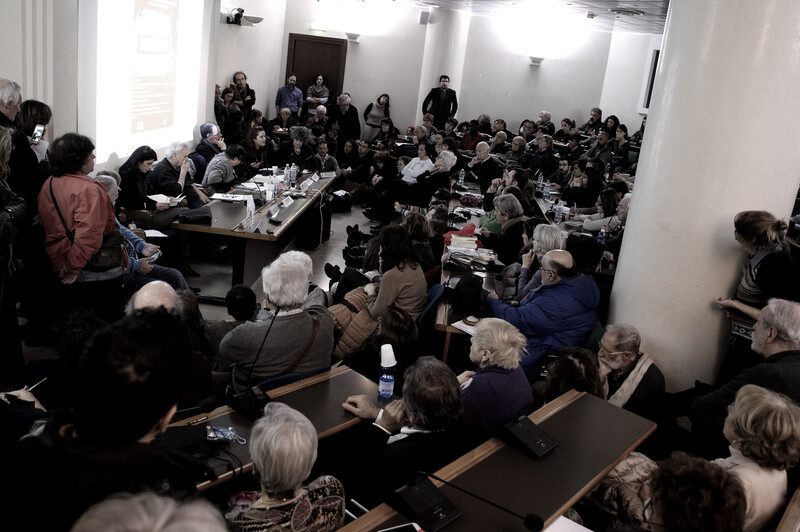The Electronic Intifada Rome 2 March 2015

The new venue for a debate with Ilan Pappe was packed with a standing room only crowd.
Ilan Pappe, the outspoken Israeli historian, has criticized an Italian university for succumbing to “Zionist intimidation” by canceling a debate in which he was scheduled to take part.
Just days before the 16 February debate was due to take place, the University of Rome III denied the event’s organizers use of its prestigious Center for Italian and French Studies for the debate. The event — dealing with the use and abuse of identity in Europe and the Middle East — did go ahead, but at a different venue.
The last-minute cancelation is another case of preemptive muzzling by an institution of higher learning. “It is very disturbing to see how freedom of speech is framed in Europe,” Pappe told The Electronic Intifada. “Ridiculing the prophet Muhammad in cartoon is the litmus test for a society that cherishes freedom of speech; however an open candid conversation about Israel and Palestine is disallowed as an incitement.”
The initial reasons given by the university referred to “procedural errors.” Pappe found this excuse to be even more sinister.
“Nobody can really say openly that they disallow a debate on Palestine, so usually technical issues are mentioned by the prospective hosts of such events, while Zionist lobbies more openly celebrate another successful case of silencing debates on Israel’s policies in Palestine,” said Pappe, who is best known for documenting how Zionist forces uprooted almost 800,000 Palestinians and destroyed more than 500 Palestinian villages in 1948.
Indeed, a pro-Israel website, Informazione Corretta, claimed victory, stating that thanks to “friends in Rome,” the venue had been denied due to protests over its proximity to the city’s Jewish quarter.
University succumbs to “intimidation”
In an email message to The Electronic Intifada, the University of Rome III press office stated that the university had not refused to host the event, as an alternative venue had been offered.
The organizers, however, were quick to point out that the alternative venue was a wholly inadequate, ill-equipped space reserved for dance performances and offered as cover for the last-minute revocation. What was far more disturbing, they say, was the university’s efforts to delegitimize the debate, denying the use of its logos and scrubbing the event from its website.
The university’s initial announcement of the event is still visible via Google cache.
Pappe, who has experienced these attempts at censorship in many countries, said, “The bad feeling is not leaving us: yet another respectable institute of higher education in Europe succumbed to Zionist intimidation and terror.”
The Zionist lobby’s attempt to silence its critics did not work. The new venue was packed with a standing room only crowd, as was a last-minute overflow room, providing the opportunity “to listen to an open debate in which Palestine was one issue in a wider conversation about power and knowledge,” said Pappe.
It also laid bare the cowardice of the university, showing more concern for external pressure groups than its own reputation, independence and societal obligations.
As Pappe noted, “The struggle here is therefore not only for the right of the Palestinians’ plight to be heard but also for academia to cease its shameful surrender to the powers that be and fulfill more courageously the role they are paid for: to be society’s watchdogs and not the puppies of the governments.”
An open letter launched by the organizers and signed by Pappe expresses outrage at the university shirking its responsibility to increase “opportunities for debates that foster critical thinking” rather than censor them.
The letter also calls on “the academic communities in the world to stand against the selective use of the principles of freedom of speech and academic freedom.” The letter was published on Sunday and quickly received more than one hundred signatures from academics around the world.
Silencing Palestine across Italy
This is just one instance in a disturbing trend of efforts to shut down discussion of Palestinian rights and history in public spaces in Italy, and the more alarming tendency of authorities to succumb to pressure and unfounded accusations.
On 27 February, Rome’s La Sapienza University revoked authorization to screen the documentary The Fading Valley by the Israeli director Irit Gal. The film deals with water issues in the occupied West Bank’s Jordan Valley.
The No Acea Mekorot Committee works to end an agreement between Rome’s water utility and the Israeli company responsible for the theft of Palestinian water resources. The group said in a press release that the cancelation followed a phone call from the Israeli embassy and objections by several students, after which the dean withdrew permission to use university facilities.
“It is unacceptable that the Israeli embassy intervenes in the decisions of Italian universities,” the committee said. “Worse still is the dishonorable and shameful way in which Italian academic institutions cave to its diktats.”
Negating Palestinian history
In Turin last November, days after an exhibition featuring photos from the digital archive of UNRWA, the UN agency for Palestine refugees, opened at the Museum of Resistance, efforts began to have it closed.
The archive is listed in the Memory of the World registry run by the United Nations culture and education organization UNESCO.
The Jewish Community of Turin threatened to cancel its organizational membership at the museum unless the exhibition was suspended, accusing the UN agency of “notoriously expressing anti-Semitic views.”
While the museum kept the exhibition open, it took the bizarre measure of posting a notice at the entrance and on its website informing visitors of the protests of the Jewish Community of Turin “criticizing the unilateral, biased and prejudiced anti-Israeli” nature of its contents.
The museum’s press office confirmed to The Electronic Intifada that this was the first time a disclaimer had been posted for an exhibition.
In addition, the museum canceled two events scheduled during the exhibition — a roundtable discussion, which included a speaker designated by the Jewish Community of Turin, due to “organizational reasons” — and a reading of the late Palestinian poet Mahmoud Darwish’s work. According to the museum, these events were pulled in order to avoid “misrepresentation” of the exhibition.
The University of Padua also recently revoked a student association’s authorization for fundraising events for Syrian and Kurdish refugees. In a posting on Facebook, organizers said they had been told of the cancelation following complaints from a single Israeli student about a map near a fundraising table, not officially part of the event, where another student had written “Palestine” over Israel.
The student organizers said the dean not only canceled future fundraising events by the group but also required that requests for events dealing with Palestine be presented jointly with an Israeli student.
Also in November, as the newspaper La Stampa reported, Daniela Santus, a professor at the University of Turin, refused to chair a panel for a discussion of a thesis by two undergraduate students because the topic was Palestine.
That same professor had invited Israel’s deputy ambassador to Italy to speak at the university in 2005.
Ruba Salih, an academic with the School of Oriental and African Studies, University of London, took part in the discussion with Pappe in Rome. Referring to comments by the philosopher Judith Butler that “not all lives are grievable,” Salih denounced the selective way in which discussions about Palestine are censored.
“When Palestinian children are described as human shields, they inevitably enter the realm of non-human, they become objects and legitimate targets of war, deprived of subjectivity,” Salih observed. “They become non-lives, or expendable lives, to safeguard the lives of those that do exist.”
Stephanie Westbrook is a US citizen based in Rome, Italy. Her articles have been published by Common Dreams, Counterpunch, The Electronic Intifada, In These Times and Z Magazine. Follow her on Twitter: @stephinrome.





